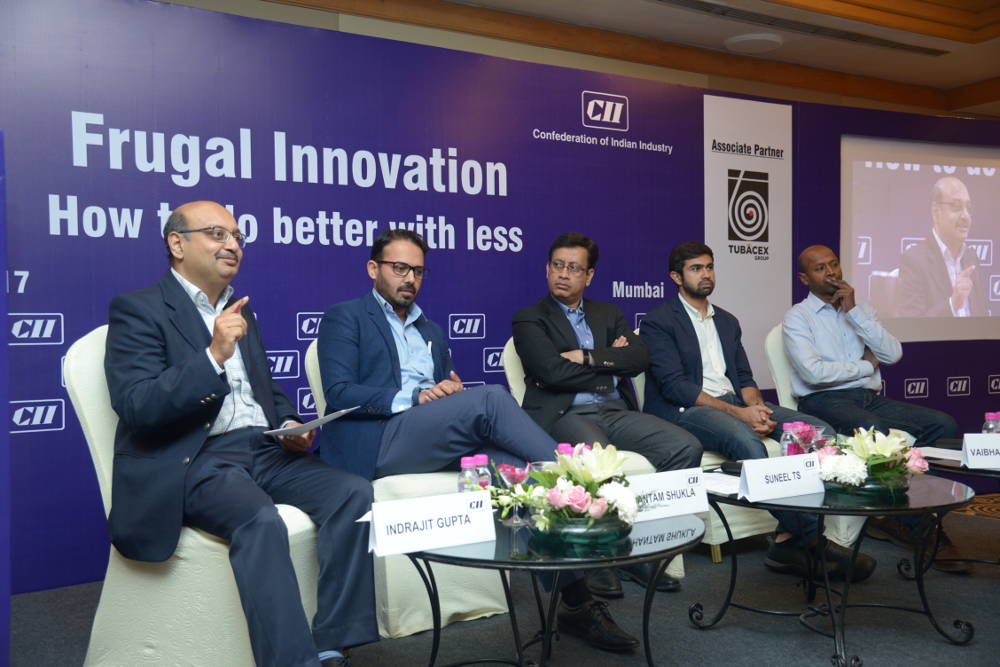Frugal innovation isn’t about doing more with less resources, but about doing better with less. And this is where India has a fantastic opportunity to write the next playbook for innovation, which even the West will adopt. It has all the ingredients to do so—it is home to the biggest, most complex challenges; there is a cultural ethos of frugality; and it is a laboratory for new experiments in business and entrepreneurship.
A line up of speakers and panellists with deep expertise in open innovation and frugality, representing big industry, start-ups and academic research, discussed this and more at ‘Frugal Innovation: How to Do Better with Less’—a session organised by the Confederation of Indian Industry (CII) in Mumbai in December 2017.
The speakers and panellists included:
- Dr Gopichand Katragadda, Chairman, CII Task Force on Innovation & CTO, Tata Sons, who delivered the keynote address.
- Navi Radjou, Innovation and Leadership Strategist, Winner of 2013 Thinkers50 Innovation Award, Co-Author, Jugaad Innovation and Frugal Innovation, who made a special presentation.
- Dr Shantam Shukla, Lead Innovation Officer, Forbes Marshall
- Dr Suneel TS, General Manager – Open Innovation, Group Technology & Innovation Office, Tata Services Ltd.
- Vaibhav Chhabra, Founder, Maker's Asylum
- Indrajit Gupta, Co-founder and Director, Founding Fuel, who moderated the panel discussion
The frugal mindset
“Different nations have different cultural advantages. The US, for instance, has the advantage of diversity. Its universities draws faculty and students from all over the world. Similarly, China’s cultural advantage is scale—even small companies will talk about reaching 250 million users. And South Korea’s is its palli-palli (quickly, quickly) mentality. India’s cultural advantage is frugality and sustainability,” Dr Katragadda said.
But frugal innovation isn’t about reverse engineering a solution created in the West. It needs to be built ground-up.
For a large, diverse entity like the Tata group it means bringing together the innovations happening at the level of the individual companies and stitching it together to deliver key technology very quickly. It requires the ability to understand what is out there, and reach into open innovation as well as the knowledge that resides within the organisation.
Watch his keynote address to learn about some of the results of this approach at Tata group as well as GE in India, where he served in a previous stint: The first closed cathode fuel cells for telecom towers, a low-cost, low-grade graphene—touted as a wonder material—to coat steel to strengthen it, GE’s ECG machine that costs just $200, and baby warmers with LED, which now the rest of the globe wants too.
Inner abundance and solving real problems
So, what happens when a solution can deliver 100x more value using 100x fewer resources? If a solution is regenerative in the impact it has on the community and the environment? What are some of the live experiments in frugal innovation being tried in India and the rest of the world to solve real problems?
Navi Radjou says innovators in resource constrained environments like India have a very different approach than in the West. For example, instead of looking to connect your fridge to your smartphone via Wi-Fi so it can remind you to buy milk, they worry about more fundamental question—can a fridge work without electricity? And how that led to Mitticool.
He talks about innovation coming out of India, Peru and Kenya that take what is abundant to address what is scarce. And about how ignorance can be power, as a beginner’s mind is open to new knowledge.
He also talks about inner abundance, which in the Indian context has a very sophisticated meaning, based on the seven chakras—of compassion, and using your gifts and talents to serve others.
A frugal economy is emerging, he says, which is powered by human energy and rests on three pillars:
- the sharing economy where businesses share assets and resources
- the DIY or maker economy
- the circular economy where products are designed so that at the end of their life, 99% of the materials can be extracted to make something new.
Watch his presentation here.
Contextualising the solutions
Don’t miss the panel discussion with Radjou, Dr Shantam Shukla, Dr Suneel TS, and Vaibhav Chhabra, moderated by Indrajit Gupta.
In this video, Gupta sets the context for the debate, of how India can look at a new way of innovation that serves everyone.
And the panellists discuss
- How ingenuity is about asking why or why not.
- Why the freedom to experiment and fail is important.
- The need to be cognisant of tacit knowledge and reuse and adapt existing technologies. And the need to create incentives for such crossing over of ideas.
- How the education system needs to change towards a more lateral learning process.


